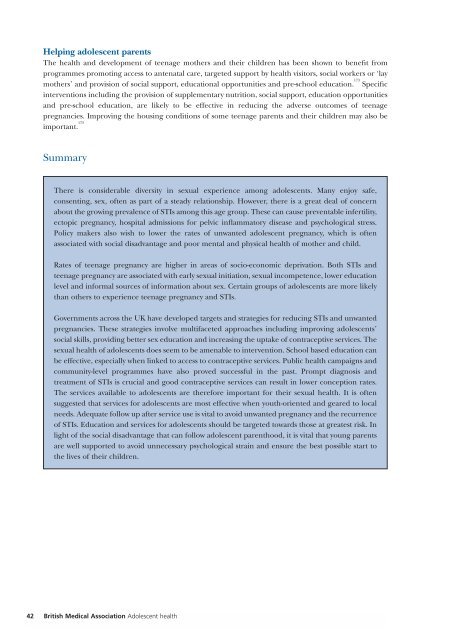Alcohol misuse: tackling the UK epidemic - London
Alcohol misuse: tackling the UK epidemic - London
Alcohol misuse: tackling the UK epidemic - London
Create successful ePaper yourself
Turn your PDF publications into a flip-book with our unique Google optimized e-Paper software.
42<br />
Helping adolescent parents<br />
The health and development of teenage mo<strong>the</strong>rs and <strong>the</strong>ir children has been shown to benefit from<br />
programmes promoting access to antenatal care, targeted support by health visitors, social workers or ‘lay<br />
mo<strong>the</strong>rs’ and provision of social support, educational opportunities and pre-school education. 173<br />
Specific<br />
interventions including <strong>the</strong> provision of supplementary nutrition, social support, education opportunities<br />
and pre-school education, are likely to be effective in reducing <strong>the</strong> adverse outcomes of teenage<br />
pregnancies. Improving <strong>the</strong> housing conditions of some teenage parents and <strong>the</strong>ir children may also be<br />
important. 173<br />
Summary<br />
There is considerable diversity in sexual experience among adolescents. Many enjoy safe,<br />
consenting, sex, often as part of a steady relationship. However, <strong>the</strong>re is a great deal of concern<br />
about <strong>the</strong> growing prevalence of STIs among this age group. These can cause preventable infertility,<br />
ectopic pregnancy, hospital admissions for pelvic inflammatory disease and psychological stress.<br />
Policy makers also wish to lower <strong>the</strong> rates of unwanted adolescent pregnancy, which is often<br />
associated with social disadvantage and poor mental and physical health of mo<strong>the</strong>r and child.<br />
Rates of teenage pregnancy are higher in areas of socio-economic deprivation. Both STIs and<br />
teenage pregnancy are associated with early sexual initiation, sexual incompetence, lower education<br />
level and informal sources of information about sex. Certain groups of adolescents are more likely<br />
than o<strong>the</strong>rs to experience teenage pregnancy and STIs.<br />
Governments across <strong>the</strong> <strong>UK</strong> have developed targets and strategies for reducing STIs and unwanted<br />
pregnancies. These strategies involve multifaceted approaches including improving adolescents’<br />
social skills, providing better sex education and increasing <strong>the</strong> uptake of contraceptive services. The<br />
sexual health of adolescents does seem to be amenable to intervention. School based education can<br />
be effective, especially when linked to access to contraceptive services. Public health campaigns and<br />
community-level programmes have also proved successful in <strong>the</strong> past. Prompt diagnosis and<br />
treatment of STIs is crucial and good contraceptive services can result in lower conception rates.<br />
The services available to adolescents are <strong>the</strong>refore important for <strong>the</strong>ir sexual health. It is often<br />
suggested that services for adolescents are most effective when youth-oriented and geared to local<br />
needs. Adequate follow up after service use is vital to avoid unwanted pregnancy and <strong>the</strong> recurrence<br />
of STIs. Education and services for adolescents should be targeted towards those at greatest risk. In<br />
light of <strong>the</strong> social disadvantage that can follow adolescent parenthood, it is vital that young parents<br />
are well supported to avoid unnecessary psychological strain and ensure <strong>the</strong> best possible start to<br />
<strong>the</strong> lives of <strong>the</strong>ir children.<br />
British Medical Association Adolescent health
















